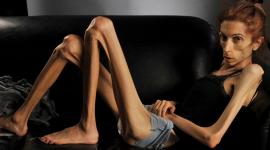Eating Disorders in Children Over the Age of 5 and Adolescents
 Children may experience brief eating problems, as may adults. It is only when a problem is prolonged and affects their behavior that action should be taken, as it can have serious implications for their health. Although there are some factors that seem to trigger eating disorders, it is impossible to predict which children it will affect. Some will refuse to eat at all, while others will 'binge' on food only to force vomiting later on. It is seen most in teenage and young adult women, although an increasing degree of eating disorder is now recognized in young men as well. There is no distinction between ethnicities or social backgrounds. Although showing itself as an obsession with body image, weight and eating, it may be due to an underlying problem with issues over which children have little control, such as sexual persuasion, chronic disease, family strife or school pressure.
Children may experience brief eating problems, as may adults. It is only when a problem is prolonged and affects their behavior that action should be taken, as it can have serious implications for their health. Although there are some factors that seem to trigger eating disorders, it is impossible to predict which children it will affect. Some will refuse to eat at all, while others will 'binge' on food only to force vomiting later on. It is seen most in teenage and young adult women, although an increasing degree of eating disorder is now recognized in young men as well. There is no distinction between ethnicities or social backgrounds. Although showing itself as an obsession with body image, weight and eating, it may be due to an underlying problem with issues over which children have little control, such as sexual persuasion, chronic disease, family strife or school pressure.
Symptoms
- Continual weight-checking or examination in a mirror
- Irrational fear of gaining weight or looking overweight
- Binge eating followed by forced vomiting and fasting
- Laxative and water-tablet abuse without any apparent need
- Compulsive exercise such as gymnastics, jogging or cycling
- Secret eating with the same kind of food, especially cakes or sweet food
- Hoarding secret supplies of food
- Poor insight into real body image with a constant perception of being grossly overweight
Causes
- Lack of self-esteem
- Bullying
- Peer, parental and social pressure to diet
- Depression and anxiety are linked but it can be difficult to tell which came first
- Solvent, alcohol or drug abuse is also linked
- Media promotion of 'slim is beautiful'
- Child abuse
Prevention
 Never put children on a diet unless medically advised to do so (see obesity in children). Be prepared to talk through their concerns and show them ways to cope with them. Aim for containing the problem if it has already taken place, then move on to improve things. Being judgmental will make things worse.
Never put children on a diet unless medically advised to do so (see obesity in children). Be prepared to talk through their concerns and show them ways to cope with them. Aim for containing the problem if it has already taken place, then move on to improve things. Being judgmental will make things worse.
Complications
Eating disorders can be life-threatening or can damage the physical and mental development of the person concerned. Tragically, suicide is also higher in children with eating disorders.
Self care
- Expert medical help is needed but parents can help, particularly by being supportive.
- Avoid talk of diets and weight loss.
- Be honest about your own feelings without being angry.
- Avoid unloading your worries on the child and, in a way, reversing roles.
- Life must go on, so try not to allow the eating disorder to disrupt the family's everyday activities.
- Involve the child in planning the next day's meal.
Action
- Contact your health visitor, or see your doctor.
next: Eating Disorders Rise Among All Children
~ eating disorders library
~ all articles on eating disorders
APA Reference
Tracy, N.
(2008, December 19). Eating Disorders in Children Over the Age of 5 and Adolescents, HealthyPlace. Retrieved
on 2025, December 25 from https://www.healthyplace.com/eating-disorders/articles/eating-disorders-in-children-over-the-age-of-5-and-adolescents



